New Tehran Mural Threatens Israel's Destruction
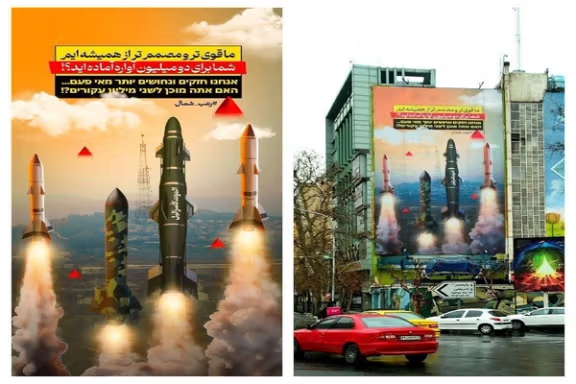
Iran's authorities have unveiled a new mural in Tehran's Palestine Square, featuring threats directed at Israel amidst a regional proxy war flamed by the regime.

Iran's authorities have unveiled a new mural in Tehran's Palestine Square, featuring threats directed at Israel amidst a regional proxy war flamed by the regime.
The mural, adorned with images of missiles and phrases in Persian and Hebrew, sends a message: "We are stronger and more determined than ever", amidst a proxy war which since October has seen Iran's militias across the region launch attacks on both Israel and its ally, the US.
Iran-backed Hamas invaded Israel on October 7, and since Israel's relentless retaliation which has blitzed Gaza, proxies in Lebanon, Syria, Iraq and Yemen have joined in solidarity with the Palestinian militia.
The latest unveiling in Tehran follows a similar display last month, accompanied by a stern warning of a "severe response", referring to the bombardment of Gaza. The actions echo the Islamic Republic's long standing anti-West, anti-Israel ideology, rooted in decades of propaganda dating back to its establishment in 1979.
Supreme Leader Ali Khamenei's 2015 declaration that "Israel must be destroyed in 25 years" reflects the regime's unwavering commitment to the goal. Despite widespread mockery from Iranians, the regime persists in its rhetoric, justifying vast support for militant groups like Hamas and Hezbollah.
However, the effectiveness of the propaganda appears to be waning, as many Iranians now express opposition to the government's stance. The sentiment is particularly evident in the ongoing Gaza conflict, where Iranians are openly supporting Israel and rejecting the regime's narratives.
The shift in public opinion reflects growing concerns about the potential consequences of Iran's aggressive stance towards Israel, including the possibility of a deadly conflict entangling the region.
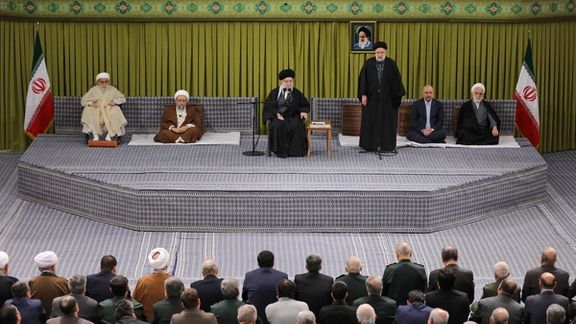
Iran's ruler, Ali Khamenei, made a fervent appeal for voter turnout in the March 1 elections, amidst indications of a potential low participation rate, signaling a declining legitimacy.
In a meeting with supporters from East Azarbaijan Province Sunday morning, Khamenei called for self-reflection and “enhancing existing strengths while addressing weaknesses.” He claimed that the United States and other “enemies” want a low turnout in the elections and urged people to vote for those candidates who have been allowed to run by his obedient watchdog institutions.
While the regime’s hardcore has barred hundreds of loyal insiders from running in the elections for parliament and the Assembly of Experts, it has been trying hard to galvanize enthusiasm among a disgruntled and apathetic public. Many clerics have been recruited to urge voters to go to polling stations, praising the achievements of the regime. Even hijab rules have been relaxed for showing up at polling stations with the hope that perhaps more women will turn out.
One more sign of the regime’s need to project popularity is repeated claims that millions of people took part in the 45th anniversary of the Islamic Republic earlier in the month. Photographic evidence posted on social media showed a crowd of a few tens of thousands in Tehran. Khamenei, however, thanked the citizens on Sunday for their overwhelming presence.
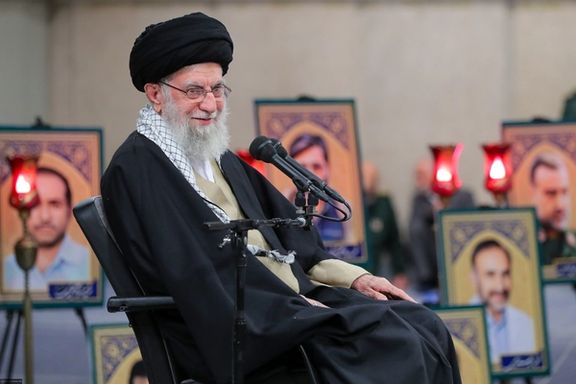
Also, government media in headlines announcing Khamenei’s meeting said “thousands of people” attended his speech. But the meeting was held in his residence and office, where a large reception hall can accommodate a few hundred people, not thousands.
The aging autocrat now in his 35th year of rule, could not resist on Sunday to speak again and again about “enemies”. He told his followers that Iran should have a “smart and non-reactive approach to the enemy.” Emphasizing the importance of the elections as a solution to problems, he called on everyone to enthusiastically participate. However, many Iranians say that repeated parliamentary and presidential elections have done little to change policies that have crippled the economy and further restricted freedoms.
With mass disqualification of candidates, few see the elections as offering a real political choice, at least within the confines of Islamic Republic’s already restricted landscape. But Khamenei claimed on Sunday that all previous elections were genuine.
“Of course, throughout these decades, electoral violations in the sense claimed by the enemy have never been observed, rendering their claims baseless. In cases where some allegations were raised, upon investigation, they were identified. However, these violations never altered the overall results, and elections in the country have always been conducted correctly, soundly, and maturely,” Khamenei insisted.
In 2009, a short time after polls closed in presidential elections authorities announced that Mahmoud Ahmadinejad was re-elected. Millions of people saw this as a fraudulent result and poured into the streets demanding a real recount. After months of protests, the other two candidates were put under house arrest without tirl. They are in their 80s now and still confined in their homes.
In 2021, all major presidential candidates were disqualified and barred from challenging Ebrahim Raisi, Khamenei’s favorite man for the position, who won the vote and formed a hardliner front with those in parliament who had been also elected in non-competitive circumstances.
Khamenei also admitted that Iran’s isolated and government-controlled economy is not performing well, but at the same time he called for preventing Western influences.
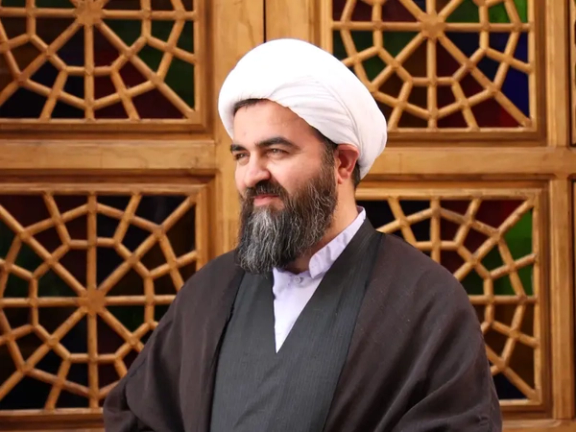
A seminary teacher was arrested by IRGC intelligence officers on Saturday in the religious city of Qom for voicing criticism of the government and the country's Supreme Leader.
Last week, on the anniversary of the Iranian revolution, Mohammad-Taghi Akbarnejad said, "This day symbolizes the negation of freedom and republicanism." He also recalled Ayatollah Khamenei's pre-revolution promise of granting people the freedom to criticize leaders.
He has been summoned and interrogated multiple times by security forces and the special clerical court in Qom, notorious for his fearless criticism of the country's Supreme Leader. However, judicial or security sources have yet to confirm or deny the latest development.
Social media images, including those on Akbarnejad's Instagram account, depict supporters of the Islamic Republic gathering in Qom and demanding action against the critical cleric prior to his latest arrest.
The Islamic Republic's security institutions have a history of dealing with clerics critical of Supreme Leader Ali Khamenei's policies. These clerics have often faced harsh sentences, including imprisonment and expulsion from the clergy by the special clerical court.
His arrest follows the detainment of Abdolhamid Masoumi Tehrani, a critical cleric from Tehran, in October 2022, where some of his personal belongings were confiscated. Similarly, in 2018, Hassan Aghamiri, an active cleric on social media, received a two-year suspended sentence and permanent expulsion from the clergy by Branch 2 of the Special Clerical Court.
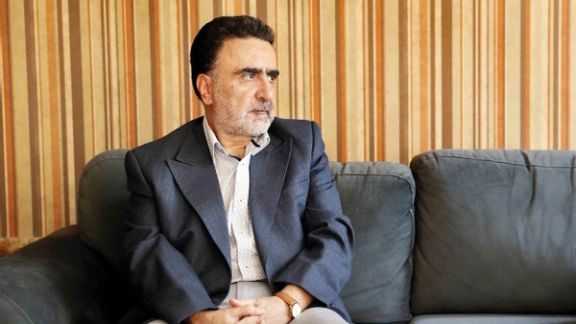
Mostafa Tajzadeh, a prominent political prisoner held in Evin Prison, accused the Supreme Leader of turning a blind eye to the nation's challenges on the eve of upcoming elections.
Tajzadeh slammed Ali Khamenei saying he "has closed his eyes to Iran's disastrous realities and ignores the cries of millions of Iranians in protest." He also highlighted widespread public disinterest in participating in the upcoming elections, stating "most Iranians have decided not to vote."
The country finds itself grappling with a myriad of economic woes that threaten to overshadow the political process. With the vote just around the corner, citizens are increasingly concerned about the state of the economy which has been battered by a combination of internal mismanagement and external pressures.
Rampant inflation and currency depreciation have eroded the purchasing power of ordinary Iranians, making it increasingly difficult for them to afford basic necessities. High unemployment rates, especially among the youth, further compound the economic distress, fueling social unrest and discontent.
In addition to the systemic issues, endemic corruption and mismanagement within the government have undermined public trust and confidence in the political establishment. Many Iranians feel disillusioned with their leaders' inability to address the root causes of economic instability and enact meaningful reforms.
The regime's heavy-handed tactics, including arrests, executions, censorship, and intimidation of political dissidents, have also created a climate of fear and mistrust among the population.
While allegations of electoral fraud have plagued previous elections in Iran, Supreme Leader Ali Khamenei maintains that the electoral process has been fair and transparent. He stated in his Sunday speech that "elections in Iran have always been healthy," dismissing claims of violations as unfounded.
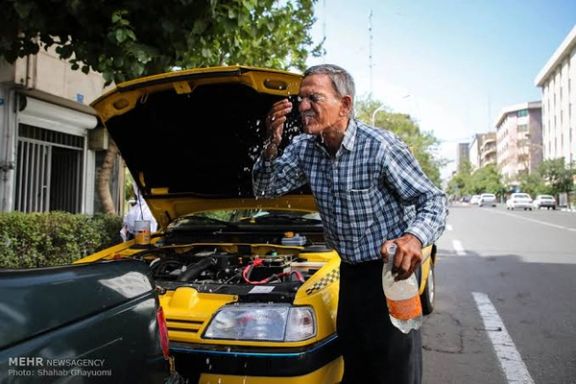
The head of Iran’s Meteorological Organization has issued a warning about the unprecedented temperature increases expected in the country.
Sahar Tajbakhsh said, "this year the country has experienced the hottest November-December in the past 33 years."
Tajbakhsh further highlighted that "the temperature in some of the country's meteorological stations, such as Parsabad in the northwestern region, has reached about 20 degrees Celsius," describing it as "a very strange record for the country."
While the global temperature rise due to climate change has become a crisis worldwide, its rapid and intense impact in regions like Iran has led to drought and water stress.
The Meteorological Organization recently reported that the total precipitation in Iran from the beginning of the hydrological year (October) until February 8th has been below the long-term average for the period.
This situation is occurring despite several periods of widespread snow and rain in vast areas of Iran, which had raised hopes for a reduction in the water crisis among the general public.
However, according to the National Water and Wastewater Company, as of January 23, 339 cities in Iran are experiencing water shortages, indicating an increase compared to last year.
According to reports, over the past seven years, one-fourth of Iran's farmers have been deprived of their livelihoods, primarily as a result of water scarcity.
The consequences of the drought reach beyond economic realms, with soil erosion, desertification, and dust storms impacting nearly half of Iran's population.
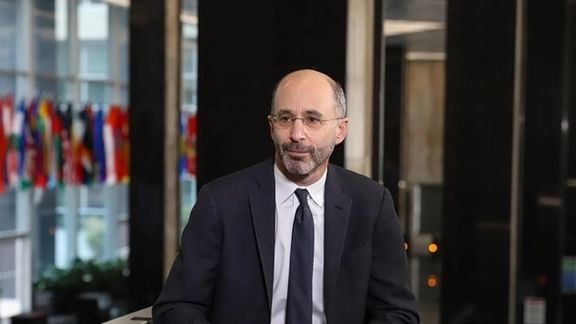
As the case surrounding the suspension of US special envoy to Iran, Robert Malley, stalls, the State Department’s Inspector General has opened an internal investigation into the steps before and after the suspension.
Ryan Holden, the Inspector General’s director of congressional and public affairs, announced last month that a probe had been launched as questions as to Malley’s suspension remain unanswered.
The Diplomatic Security Service revoked Malley's security clearance last April though for another three months, Malley continued to perform many of the duties within his scope of work before being placed on unpaid leave in June.
It comes as the Federal Bureau of Investigation is also still investigating Malley for alleged mishandling of classified information, following State Department allegations in April that it had received information about him “that raises serious security concerns and can be disqualifying under National Security Adjudicative Guidelines”.
In Holden’s announcement of the investigation, he wrote: “The scope of the special review of the suspension of Robert Malley’s clearance will include the procedures the Department used in suspending the clearance as well as actions taken by the Department following the suspension.”
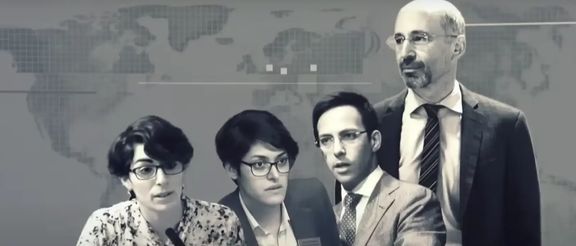
It may also mean that decisions will finally be made about his employment status. Holden said the investigation will include "whether the Department followed proper procedures in suspending his clearance, determining what access to information he could maintain, and deciding the status of his employment”.
State Department staff will now be interviewed as part of the investigation with a new probe into documents and emails surrounding Malley and his work, for a report which will eventually be made public.
“The special review will also examine which officials were involved in these decisions and how the process compares to that used for other types of employees,” explained Holden.
In a joint investigation with Semafor, Iran International revealed in September that senior aides to Malley, both inside the US government and at Crisis Group, had been part of the Iran Experts Initiative, a network of academics and researchers that Iranian officials used to promote Tehran’s positions on its nuclear program during the Obama Administration. This was also not disclosed by Malley.
Earlier this month, Iran International reported that the NGO Malley headed before becoming special envoy, the International Crisis Group, had forged a formal research agreement with Iran’s Foreign Ministry in 2016, which it had not publicly disclosed.
The ongoing mystery surrounding the Malley case comes in the lead up to the November Presidential elections. The Biden administration has remained largely silent on the controversy during a year in which the Republicans have slammed the Democrats’ Iran policy.
Amidst hostage deals freeing up billions of dollars of Iranian funds and almost 200 attacks from Iran’s proxies, Biden has been branded weak and the Malley saga has only added fuel to the fire, Malley seen to be protected by Biden amid allegations of influence and deception.
Fears among Republicans now are that the investigation findings will not be revealed until after the elections, allowing Biden to avoid the shame of the envoy’s shady dealings.
In the wake of the revelations, Senator Lindsey Graham said: "If the allegations in this story are remotely accurate, it would be stunning on so many levels."
Republican Senator Tom Cotton wrote on X: "Senior officials in both the Biden and Obama administrations were likely party to an Iranian-backed PR campaign.”
As the lack of transparency drags on, Republican Congresswoman Claudia Tenney introduced the ‘Robert Malley Act’ in December, in a bid for US lawmakers to more easily access informations on the case. It states that its implementation requires "the heads of executive agencies to disclose, upon request, relevant information to congressional committees regarding the furlough or indefinite suspension of employees.”
Malley himself has also remained largely silent since the scandal broke, issuing only a short statement to Axios after his suspension, hoping for the investigation to be resolved “favorably and soon”.